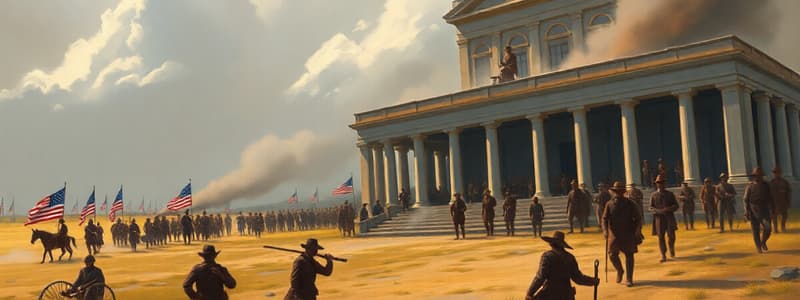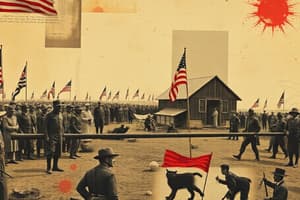Podcast
Questions and Answers
Which event marked the beginning of the American Civil War?
Which event marked the beginning of the American Civil War?
- Election of 1860
- Fort Sumter (correct)
- Harpers Ferry Raid
- Battle of Gettysburg
What legislative act favored the idea of popular sovereignty regarding the status of slavery in new territories?
What legislative act favored the idea of popular sovereignty regarding the status of slavery in new territories?
- Emancipation Proclamation
- Compromise of 1850
- Wilmot Proviso
- Kansas-Nebraska Act (correct)
Which amendment abolished slavery in the United States?
Which amendment abolished slavery in the United States?
- 14th Amendment
- 15th Amendment
- Reconstruction Act
- 13th Amendment (correct)
What significant wartime strategy was primarily implemented by Union General William Tecumseh Sherman?
What significant wartime strategy was primarily implemented by Union General William Tecumseh Sherman?
Which major Supreme Court decision declared that African Americans could not be considered citizens?
Which major Supreme Court decision declared that African Americans could not be considered citizens?
What was the primary motivation for colonization by the Puritans in New England?
What was the primary motivation for colonization by the Puritans in New England?
Which event marked a significant turning point in the American Revolution and helped secure French support?
Which event marked a significant turning point in the American Revolution and helped secure French support?
What did the Missouri Compromise aim to achieve regarding slavery?
What did the Missouri Compromise aim to achieve regarding slavery?
What was John Peter Zenger most known for in American history?
What was John Peter Zenger most known for in American history?
Which legal principle was established by the Supreme Court case Marbury v. Madison?
Which legal principle was established by the Supreme Court case Marbury v. Madison?
How did the Navigation Acts reflect the economic policy of mercantilism?
How did the Navigation Acts reflect the economic policy of mercantilism?
Which event was a direct consequence of the Intolerable Acts?
Which event was a direct consequence of the Intolerable Acts?
What was the significance of the Federalist Papers?
What was the significance of the Federalist Papers?
What was the primary outcome of Bacon's Rebellion?
What was the primary outcome of Bacon's Rebellion?
What was the primary goal of the Seneca Falls Convention in 1848?
What was the primary goal of the Seneca Falls Convention in 1848?
Which economic policy is characterized by government control over colonial trade and commerce?
Which economic policy is characterized by government control over colonial trade and commerce?
What was the impact of the Alien and Sedition Acts on American politics?
What was the impact of the Alien and Sedition Acts on American politics?
What was a major effect of the War of 1812 on American nationalism?
What was a major effect of the War of 1812 on American nationalism?
Which of the following best describes the concept of Republican Motherhood?
Which of the following best describes the concept of Republican Motherhood?
Which Supreme Court case solidified the federal government's power over the states?
Which Supreme Court case solidified the federal government's power over the states?
Flashcards
Manifest Destiny
Manifest Destiny
The belief that the United States should expand its territory from the Atlantic Ocean to the Pacific Ocean.
Compromise of 1850
Compromise of 1850
This compromise, which sought to appease both pro-slavery and anti-slavery groups, included admitting California as a free state, creating a Fugitive Slave Act, and allowing popular sovereignty to determine the status of slavery in New Mexico and Utah.
Dred Scott v. Sanford
Dred Scott v. Sanford
A landmark Supreme Court case that ruled that slaves were not considered citizens and therefore had no legal rights.
Bleeding Kansas
Bleeding Kansas
Signup and view all the flashcards
Gettysburg Address
Gettysburg Address
Signup and view all the flashcards
Columbian Exchange
Columbian Exchange
Signup and view all the flashcards
Starving Time
Starving Time
Signup and view all the flashcards
Puritans
Puritans
Signup and view all the flashcards
John Winthrop's 'City Upon a Hill'
John Winthrop's 'City Upon a Hill'
Signup and view all the flashcards
Anne Hutchinson & Roger Williams
Anne Hutchinson & Roger Williams
Signup and view all the flashcards
Mercantilism; Navigation Acts
Mercantilism; Navigation Acts
Signup and view all the flashcards
Triangular Trade; Middle Passage
Triangular Trade; Middle Passage
Signup and view all the flashcards
Enlightenment; John Locke; Social Contract Theory
Enlightenment; John Locke; Social Contract Theory
Signup and view all the flashcards
First Great Awakening; Edwards, Whitefield
First Great Awakening; Edwards, Whitefield
Signup and view all the flashcards
Salutary Neglect
Salutary Neglect
Signup and view all the flashcards
French and Indian War
French and Indian War
Signup and view all the flashcards
Stamp Act; Sons of Liberty
Stamp Act; Sons of Liberty
Signup and view all the flashcards
Boston Tea Party
Boston Tea Party
Signup and view all the flashcards
Thomas Paine, Common Sense, The Crisis; T. Jefferson, Declaration of Independence
Thomas Paine, Common Sense, The Crisis; T. Jefferson, Declaration of Independence
Signup and view all the flashcards
Battle of Saratoga
Battle of Saratoga
Signup and view all the flashcards



